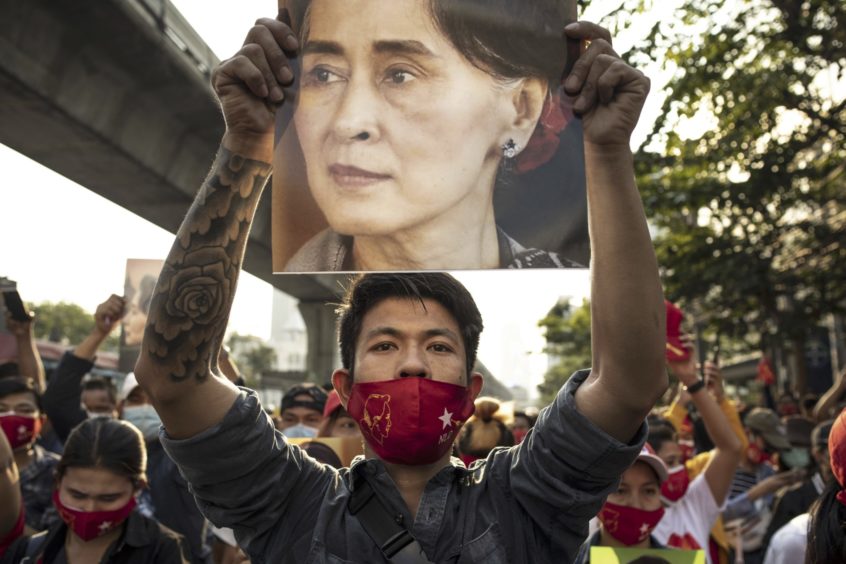
Activist group Justice For Myanmar, which documents military-linked financial matters in the country, has accused French major Total of making excessive profits at Myanmar’s expense.
In a report ‘Is Total profiteering in Myanmar?’ published yesterday, the activist group said that “contractual arrangements for the lucrative Yadana gas project may have been rigged to enable foreign energy giants to make excessive profits at Myanmar’s expense.”
The Yadana gas field and pipelines are operated by Total on behalf of partners Chevron, PTT, a Thai state-owned oil and gas company, and Myanma Oil and Gas Enterprise (MOGE), a state-owned company of Myanmar. Total operates the gas field with a working interest of 31.2%, Chevron 28.3%, PTT 25.5%, and MOGE 15%.
Justice For Myanmar made the allegations against Total after analysing leaked financial records centring on the Yadana project.
“The leaked financial statements show that Total and its partners have been making unbelievably high profits from a pipeline taking Yadana’s gas to Thailand,” said the activist group.
The leaked records which were obtained by Distributed Denial of Secrets, a non-profit transparency collective.
“The leaked financial statements show that from 2017 to 2019, the pipeline company made an enormous US$1.23 billion in profits before tax but only cost US$22.3 million to run,” said Justice For Myanmar.
“This means a profit margin of a massive 97% before tax (for the pipeline company), which is far higher than any company could normally expect to make,” said the group.
“By comparison, Total reported a profit margin of only 13% from running the gas fields which supply the pipeline,” added the activists.
The group did not report how much taxes Total paid.
However, Total said on 4 May that the percentage of royalties paid is 10%. “We paid a total of $28.1 million for taxes related to the operation of blocks M5 and M6 (Yadana) in 2020 on behalf of Total as reported in the universal registration document for the year 2020.”
“Total and its partners, including Chevron, run the Yadana gas fields and also own the pipeline so that, in effect, they are paying themselves to use the pipeline,” said the activist group.
Total said “there are no extraordinary profits. Profits are linked to the price of export gas that Thailand agrees to pay. They are shared between the transport and the production of gas. The pattern is classic and it was endorsed with the Myanmar authorities at the time and continued with successive governments to this day. This is the same scheme endorsed for the Zawtika developments operated by PTTEP and Yetagun operated by Petronas as well as the scheme endorsed by the NLD-led government in 2019 for the A6 offshore gas project (which Total announced it had suspended). The profitability of the Yadana project (integrating the upstream and downstream part) is within the industry’s average profitability.”
French newspaper Le Monde, which also reported the story, quoted an oil contracts expert as saying: “When all of the profit is on transport, it is a particularly aggressive tax optimisation. It doesn’t have to be corruption. Simply, taxes paid on transport are generally much lower than those paid on production.”
Total told Le Monde that successive governments in Myanmar have been happy to go along with the Yadana contracts which were agreed in the mid-1990s.
“The pipeline fees are just one part of a secretive web of offshore financial transactions between foreign investors and Myanma Oil and Gas Enterprise (MOGE), the state-owned entity firmly under the generals’ control for most of the last two decades,” said Justice For Myanmar.
“Extractive industry analysts have estimated that the generals gave away hundreds of millions of dollars a year in tax breaks to foreign oil companies while stashing billions of dollars in opaque other accounts at Myanmar’s state banks, much of which has disappeared from public view,” added the group.
“The original contracts between Total and Myanmar, which date from the mid-1990s, suggest that the more money is paid in pipeline fees, the less Myanmar earns in profits and royalties on gas sales,” said the group.
“As a result, Myanmar could have lost out on hundreds of millions of dollars in gas sales profits and royalties over the last two decades,” said Justice For Myanmar.
Justice For Myanmar calls for Total to immediately suspend all payments to the military junta and place funds in a protected account until democracy is restored in Myanmar.
The atmosphere in Myanmar has been extremely volatile since the military seized power from the National League for Democracy (NLD) government on 1 February. The military coup detained State Counselor Aung San Suu Kyi and President Win Myint in the country’s first coup since 1988, bringing an end to a decade of civilian rule.
The Yadana project has been subject to much criticism in the international community over the years, particularly because companies of democratic nations invested in a regime that was noted for its human rights violations
“The costs of building the pipeline, which was constructed using forced labour under the guns of the Myanmar military, have long since been paid off,” said Justice For Myanmar.
“This means the fees from the pipeline represent almost pure profit, a much bigger share of which goes to Total and its foreign partners,” added the group.
Pouyanne said Total hadn’t paid taxes directly to the military government since the February coup because the banking system no longer functioned. Once re-established, however, the company would have to stop producing gas if it wanted to close off this revenue source.
Thai authorities have also told Total the gas is a vital source of energy for their population in the west of the country, he said, adding that most of the taxes come from gas exports and are paid by Thai oil group PTT.
